October 2. BAHAR DAR "Touring the Monasteries of Lake Tana" (continued) Our second stop was just around the end of the peninsula at Azuwa Maryam, another church from the 19th century or later. Apparently this church got more visitors because souvenir tables were set up outside the gate. The museum was laid out similar to the other two we had just seen but was located closer to the water. The fenced in area was larger and the surrounding trees shorter so we were able to get a better look at the outside of the church. This museum also had a small museum, a bit big bigger than the last, with some interesting items. A priest dressed in a long golden robe and a white cap opened the doors so we left an appropriate tip. He blessed Rob with his cross and was kind enough to pose for a photo.
The last monastery we visited on the Zege Peninsula was its most famous one, Ura Kidane Meret, said to date from the 16th - 18th centuries. The book warned of 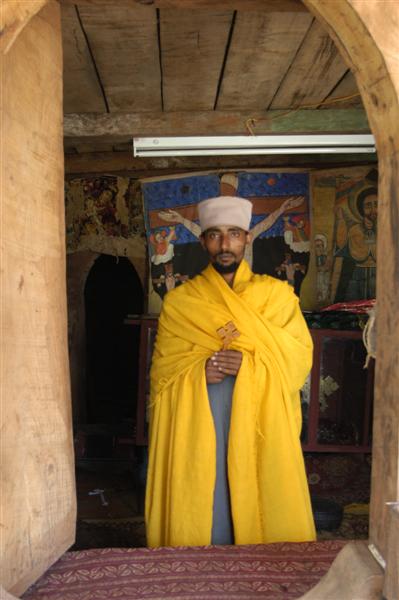 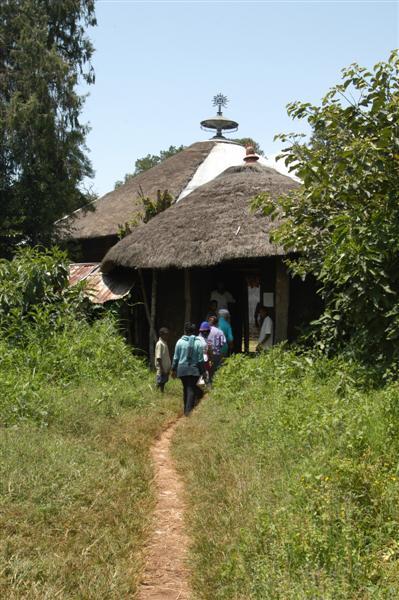 touts and hassles but they seemed to have gotten the situation under better control. It was a ten minute walk to the monastery and we had several offers from persistent guides but chose to enlist some help from a young boy. Having already had a tour of the iconography at the first monastery we didn't really want or have time for another tour but the boy sort of insulated us from the would-be guides. A small village stood between the boat dock and the monastery but all of the people selling goods were kept behind their tables of goods and didn't trail after us. In retrospect it might have been better to have hired a guide for Ura Kidane Meret instead of the first monastery. The monastery was much bigger and the images more impressive but if we'd waited to get a guide we also wouldn't have enjoyed the first three monasteries as much. We took some time to go through the images on our own and then checked out the sizable collection of old crosses and crowns in the little museum. touts and hassles but they seemed to have gotten the situation under better control. It was a ten minute walk to the monastery and we had several offers from persistent guides but chose to enlist some help from a young boy. Having already had a tour of the iconography at the first monastery we didn't really want or have time for another tour but the boy sort of insulated us from the would-be guides. A small village stood between the boat dock and the monastery but all of the people selling goods were kept behind their tables of goods and didn't trail after us. In retrospect it might have been better to have hired a guide for Ura Kidane Meret instead of the first monastery. The monastery was much bigger and the images more impressive but if we'd waited to get a guide we also wouldn't have enjoyed the first three monasteries as much. We took some time to go through the images on our own and then checked out the sizable collection of old crosses and crowns in the little museum.
With the Zege Peninsula behind us the boat headed for an island in the middle of the bay, to the monastery of Kebran Gabriel. Women weren't allowed to visit this monastery so I had to wait with the boat while Rob and our driver when on the tour. The monastery dated from the 17th century and was cloistered in the middle of the island on a hill that was surrounded in trees. I could just make out the roof as we approached in the boat. Rob said it was one of the priests who gave the tour and showed them some of the monastery's precious crosses and manuscripts. The one distinguishing feature of the monastery architecturally 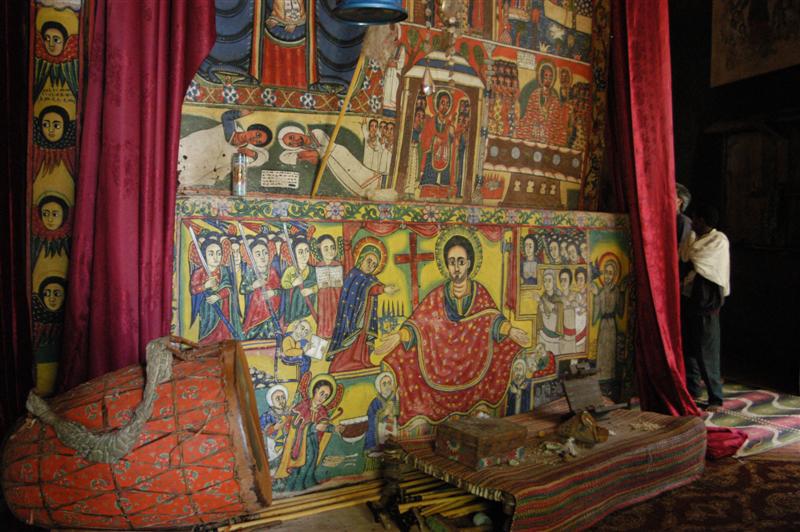 was a 12 columned was a 12 columned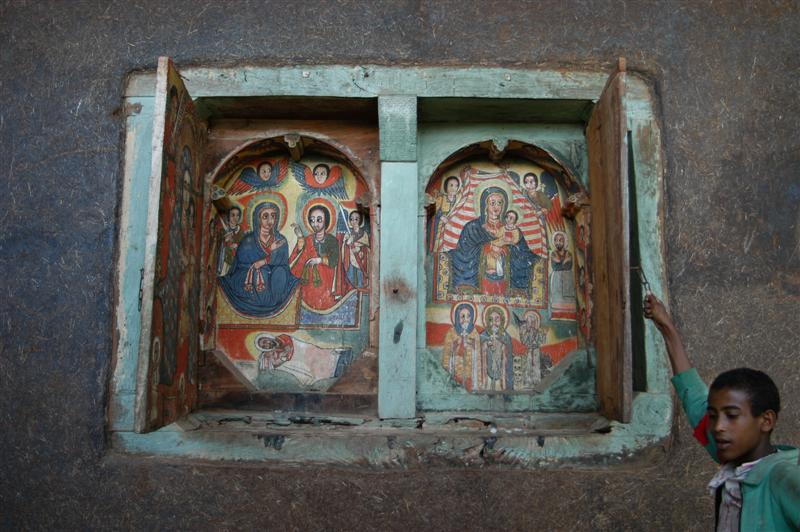 portico. portico.
From Kebran Gabriel the boat crossed the entire bay, almost to the opposite shore to reach Debre Maryam, our last monastery (Debre means "mount" in Ge'ez). Our boat man had to back into a vegetated inlet where we got off of the boat and were greeted by some children. He gestured for them to show us to the monastery and we followed along a trail lined with coffee, mango and fig trees until the small building came into view. As a structure it was much less impressive than the rest, with a corrugated steel roof and dilapidated walls. We initially wondered if it has been worth the trip. The original monastery dated from the 14th century but it was rebuilt in the 19th century with modern additions. One of the children went off to find the caretaker while we waited. They returned about five minutes later. The man with the keys didn't look like a priest, or at least he wasn't dressed like one. The interior of the church wasn't painted but the monastery housed a wonderful little collection of treasures which the caretaker kindly drew out of the maqda to show us. He opened a lovely manuscript and brought out a cross and a colorful umbrella, posing patiently while I took some photos.
From Debre Maryam it was another half hour back to the landing. It had been a fantastic day. Riding in the boat was so relaxing and the hassles had been few and manageable. The churches had been a wonderful introduction to Ethiopia's Orthodox history. The man from the Marine Authority greeted the boat. We were a little later than planned but it didn't seem to be a problem. Our boatman was quite pleased with his tip and it was his time that we were paying for as much a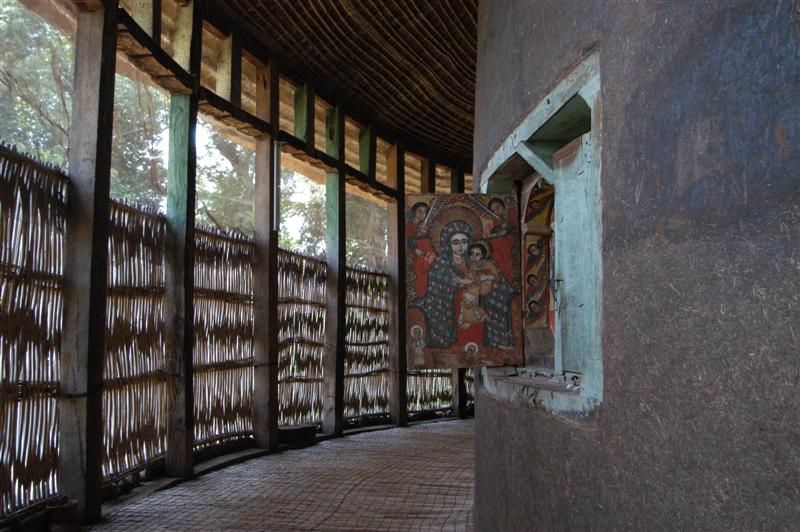 s the boat. The boat would have cost us the same for a few hours or the s the boat. The boat would have cost us the same for a few hours or the 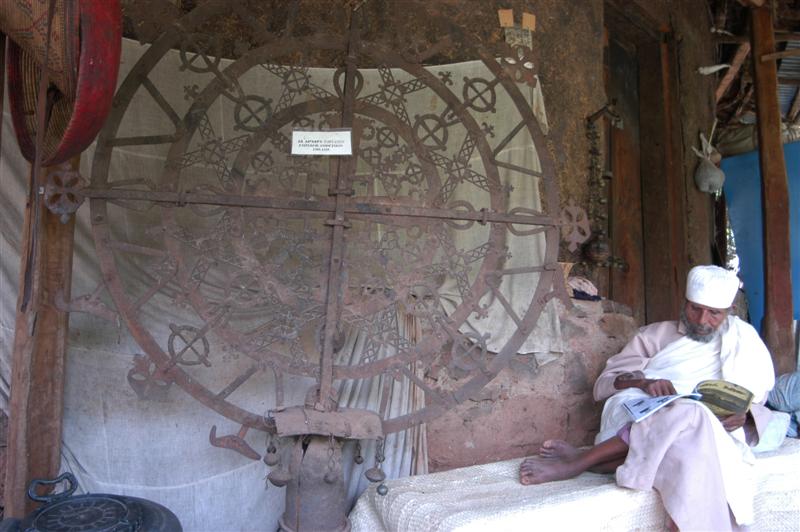 whole day. We thanked them both for a great day and walked over to the Dib Anbessa hotel for another traditional Ethiopian meal and a coffee in the bar. Each time we went to and from the hotel we were followed by a pair children that belongs to a woman that ran a kiosk along the road. As soon as they saw us they would grab our hands and tag along until we got too far away. It was very cute but ultimately ended in gestures for money. whole day. We thanked them both for a great day and walked over to the Dib Anbessa hotel for another traditional Ethiopian meal and a coffee in the bar. Each time we went to and from the hotel we were followed by a pair children that belongs to a woman that ran a kiosk along the road. As soon as they saw us they would grab our hands and tag along until we got too far away. It was very cute but ultimately ended in gestures for money.
Back at the hotel we met two couples that we had seen at Kebran Gabriel. There was a British fellow and his Ethiopian wife and a couple of friends of his from Britain that were visiting. It was from them that we found out more about rides to Gonder. Apparently there were jeeps that went back and forth regularly, AID vehicles that picked up extra money by carrying passengers. Their contact, Big Daniel from the Ghion Hotel, came by to talk to them about rides. The British couple was going on to Gonder and Daniel was arranging their ride. Rob got his contact info and asked about getting a rid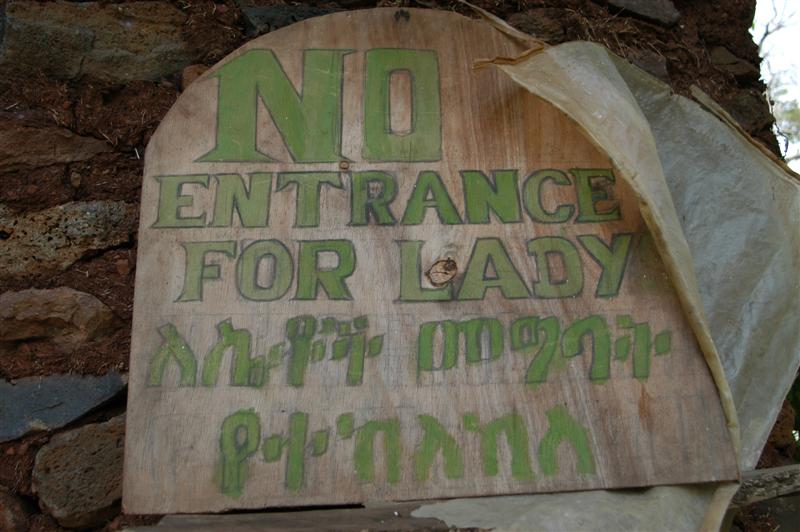 e out the following morning. He e out the following morning. He 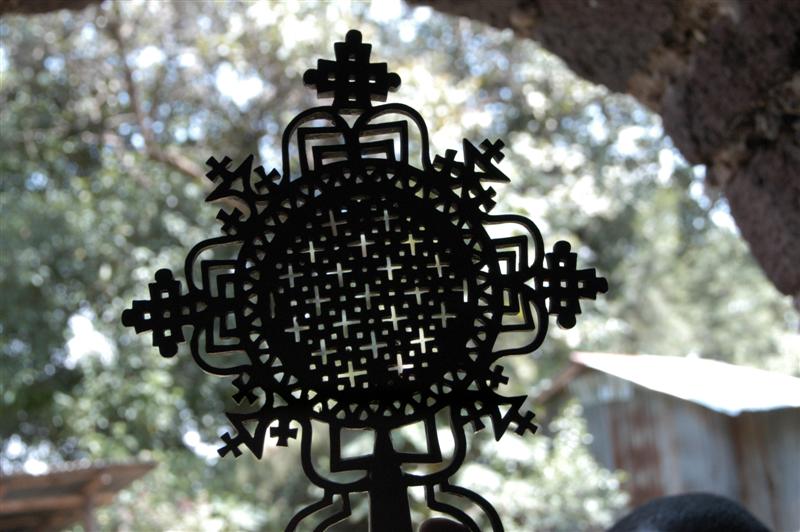 followed up later and was put in touch with a friend of Daniel's. The guy took Rob to a sort of ride broker that hung out in the center of town but then there was all kind of confusion over what the ticket cost and what this guy wanted for having introduced Rob to the broker and so on. If this guy had been smarter he would have just mediated and gotten the tickets for us but in the end he didn't really do that much. The whole situation made Rob uneasy so followed up later and was put in touch with a friend of Daniel's. The guy took Rob to a sort of ride broker that hung out in the center of town but then there was all kind of confusion over what the ticket cost and what this guy wanted for having introduced Rob to the broker and so on. If this guy had been smarter he would have just mediated and gotten the tickets for us but in the end he didn't really do that much. The whole situation made Rob uneasy so
he finally just walked away and tried to get hold of Daniel again. He said the jeeps leaving the following day were already full now but he would work on something for us for 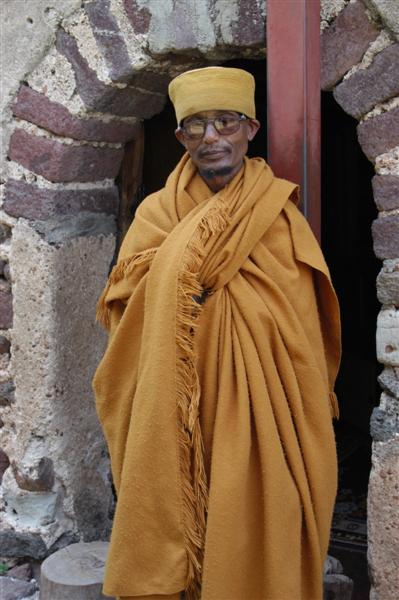 the day after that. That meant we were stuck in Bahar Dar for another day or we could try the public bus. The public buses were supposed to be a nightmare so we decided to wait for a jeep. We would only have one day in Gonder but in a jeep the trip should only take two hours so we should have plenty of time. the day after that. That meant we were stuck in Bahar Dar for another day or we could try the public bus. The public buses were supposed to be a nightmare so we decided to wait for a jeep. We would only have one day in Gonder but in a jeep the trip should only take two hours so we should have plenty of time.
October 3. BAHAR DAR The food at the Papyrus Hotel had been pretty poor but we finally had one bad breakfast too many. It was just a continental breakfast but they even did that poorly. When they forgot to give me my toast and I said something they materialized four pieces of rock hard bread. I noticed that they had just cleared another table where the man hadn't eaten any of his toast so it looked an awful lot like they were recycling his toast on me. Every other morning the toast had been warm. It had been sitting on his table with flies buzzing around so I lot my appetite. We resolved to move to another hotel. They had given us a discounted rate for staying three nights but the Dib Anbessa had much better food, t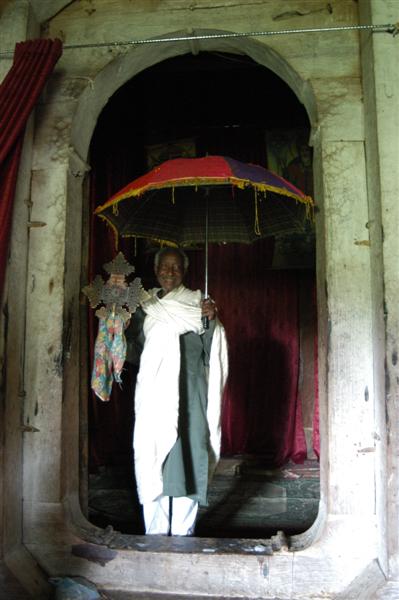 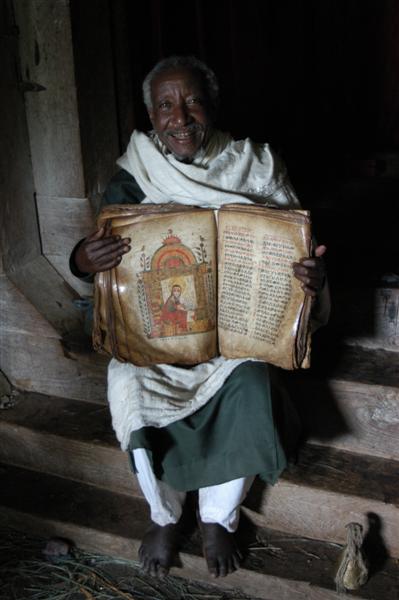 he rooms were decent, and their prices weren't double what was posted in the guidebook. We walked our bags through town and checked in. When Rob heard from Daniel we found out that there weren't any jeeps going to Gonder on the following morning but he could get us into a minivan that had come one-way with a group of tourists and had to go back. he rooms were decent, and their prices weren't double what was posted in the guidebook. We walked our bags through town and checked in. When Rob heard from Daniel we found out that there weren't any jeeps going to Gonder on the following morning but he could get us into a minivan that had come one-way with a group of tourists and had to go back.
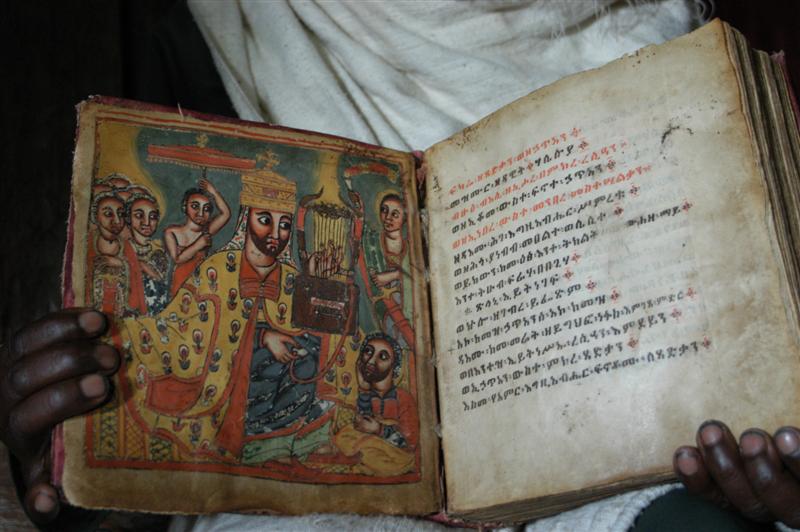 There was a wedding reception at the Dib Anbessa that afternoon, causing a fair amount of singing and commotion in the hallway for a while but it eventually died down and I just did journal writing all day long. We had dinner in the hotel restaurant and tried to get to bed early. The van would be around at 5am to pick up. The beds were hard and there were more mosquitoes since we were near the lake but otherwise the room was okay. There was a wedding reception at the Dib Anbessa that afternoon, causing a fair amount of singing and commotion in the hallway for a while but it eventually died down and I just did journal writing all day long. We had dinner in the hotel restaurant and tried to get to bed early. The van would be around at 5am to pick up. The beds were hard and there were more mosquitoes since we were near the lake but otherwise the room was okay.
|

